
International Journal of Environmental Research
Scope & Guideline
Innovating solutions for global ecological challenges.
Introduction
Aims and Scopes
- Environmental Pollution Assessment:
The journal publishes research assessing various environmental pollutants, including heavy metals, microplastics, and organic contaminants, across different ecosystems. This includes studies on their sources, distribution, and impacts on human health and biodiversity. - Sustainable Waste Management:
Research on sustainable approaches to waste management, including recycling, waste-to-energy processes, and the treatment of industrial and municipal waste. The journal emphasizes innovative methods for reducing waste and promoting resource recovery. - Climate Change and Environmental Impact Studies:
The journal includes studies that evaluate the effects of climate change on ecosystems, agriculture, and human health, alongside research on mitigation strategies and adaptation practices. - Innovative Remediation Technologies:
It publishes research on novel remediation technologies for contaminated sites, including bioremediation, phytoremediation, and advanced oxidation processes, highlighting their effectiveness and mechanisms. - Environmental Policy and Governance:
The journal also addresses the intersection of environmental science and policy, exploring the implications of environmental regulations, governance frameworks, and public health initiatives.
Trending and Emerging
- Microplastics and Nanoplastics Research:
There is a noticeable increase in research addressing the sources, impacts, and remediation strategies for microplastics and nanoplastics, reflecting heightened global awareness of plastic pollution. - Digital Technologies in Environmental Monitoring:
Emerging themes include the application of digital technologies, such as the Internet of Things (IoT) and machine learning, for real-time environmental monitoring and data analysis, enhancing the precision of environmental assessments. - Circular Economy Practices:
Research focused on circular economy practices, including resource recovery and waste valorization, is trending, indicating a shift towards sustainability and the efficient use of materials. - Health Impacts of Environmental Change:
There is an increasing trend in studies linking environmental changes, such as climate fluctuations and pollution, to public health outcomes, highlighting the intersection of environmental science and health. - Innovative Bioremediation Techniques:
The journal is seeing a rise in publications on innovative bioremediation techniques, showcasing advances in using microorganisms and plants to remediate contaminated environments.
Declining or Waning
- Traditional Agricultural Practices:
Research on conventional agricultural practices and their environmental impacts has decreased, possibly due to a shift towards sustainable and precision agriculture methodologies. - Static Water Quality Assessments:
The prevalence of studies focused solely on static water quality assessments has waned, as there is an increasing emphasis on dynamic modeling and the effects of climate variability on water resources. - Generalized Air Quality Studies:
Broad studies on air quality without specific contextual focus are becoming less common, as the journal shifts towards more targeted investigations that account for local conditions and specific pollutant sources. - Single-Pollutant Focus:
Research that concentrates on the effects of a single pollutant is declining, in favor of studies that look at the interactions between multiple pollutants and their cumulative environmental impacts.
Similar Journals
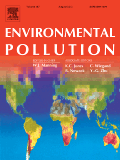
ENVIRONMENTAL POLLUTION
Championing sustainable practices through rigorous research.Environmental Pollution, published by Elsevier Science Ltd, stands at the forefront of research related to environmental contaminants and their effects on health and ecosystems. With an impressive impact factor reflected in its Q1 rankings across various categories including Health, Toxicology, and Pollution, this journal is a pivotal resource for academics and professionals in the fields of environmental science and toxicology. The journal, established in 1973, continues to disseminate high-quality articles that explore the implications of pollution and advance knowledge on toxicological impacts and mitigation strategies. Although it is not an open-access journal, it offers robust visibility within the scientific community, ensuring vital research reaches those who need it most. Researchers, students, and professionals dedicated to understanding and addressing the challenges of environmental pollution will find Environmental Pollution to be an indispensable platform for their work, guiding the ongoing dialogue on sustainable practices and public health protection.
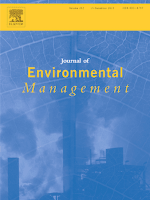
Journal of Environmental Management
Empowering knowledge for effective environmental practices.The Journal of Environmental Management is a leading peer-reviewed journal dedicated to advancing knowledge and research in the fields of environmental science, management, and policy. Published by Academic Press Ltd - Elsevier Science Ltd, this esteemed journal has been pivotal since its inception in 1973, providing a platform for innovative research, critical reviews, and insightful discussions surrounding pressing environmental issues. With an impressive impact factor placing it in the Q1 category across multiple disciplines—including Environmental Engineering and Waste Management—it ensures that published works are highly regarded and widely disseminated. Furthermore, its Scopus rankings reflect its prominence, being in the top percentile within its categories, which highlights the journal's influence on shaping environmental policies and practices. While the journal does not currently offer Open Access, it remains a crucial resource for researchers, professionals, and students committed to fostering sustainable management solutions. By continually addressing emerging challenges in environmental management, the journal serves as an essential reference point for academics and policymakers alike.

Pollution
Connecting researchers to tackle pressing environmental issues.Pollution is a distinguished open-access journal published by UNIV TEHRAN, dedicated to advancing the understanding of environmental science and the multifaceted aspects of pollution research. Since its establishment in 2015, the journal has been committed to disseminating high-quality, peer-reviewed articles that address the pressing issues of environmental degradation globally. With an impact factor and a Scopus rank that places it within the top tier of Environmental Science (Rank #141/233), Pollution serves as an essential resource for researchers, professionals, and students alike. The journal encompasses a wide range of topics, including the sources, effects, and mitigation strategies related to various forms of pollution, thereby aiming to contribute significantly to the scientific community's efforts in promoting environmental sustainability. Its innovative and timely approach positions Pollution as a vital platform for sharing knowledge and fostering interdisciplinary collaboration in the environmental science domain.
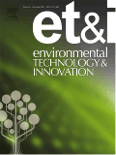
Environmental Technology & Innovation
Advancing Sustainable Solutions for a Greener TomorrowEnvironmental Technology & Innovation is a leading academic journal published by Elsevier, focusing on groundbreaking research and advancements in the fields of Environmental Science, Plant Science, and Soil Science. Since its inception in 2014, this prestigious journal has established itself in the top Q1 quartiles of its categories, reflecting its commitment to publishing high-quality, impactful research. As evidenced by its impressive Scopus ranks, including a rank of #14/516 for Plant Science and #5/159 for Soil Science, it serves as a vital resource for scholars, researchers, and professionals aiming to advance their understanding and innovation in environmental technologies. Although it operates under a subscription model, the journal provides significant insights and access options, making it an essential addition to any researcher's library. With its emphasis on sustainability and technological advancements, Environmental Technology & Innovation remains at the forefront of addressing global environmental challenges and fostering innovative solutions.

EQA-International Journal of Environmental Quality
Innovative research for a cleaner, greener world.EQA-International Journal of Environmental Quality, published by the University of Bologna, Department of Agricultural Sciences, is a premier open-access journal dedicated to the multidisciplinary exploration of environmental quality issues. Established in 2009, it aims to foster a greater understanding of the intricate interactions between human activities and environmental health. With a focus on innovative research, the journal contributes to the advancement of knowledge across diverse fields, making it an essential resource for researchers, professionals, and students engaged in environmental science and sustainability. The journal operates with an emphasis on accessibility, ensuring that critical findings reach a global audience without barriers. With an impressive Scopus rank of 88 out of 171, EQA stands as a significant platform for disseminating impactful research that informs policy and promotes environmental stewardship.

Environmental Engineering and Management Journal
Championing knowledge for a healthier planet.Welcome to the Environmental Engineering and Management Journal, a pivotal platform for disseminating knowledge and innovative research in the fields of Environmental Engineering, Management, Monitoring, Policy, and Law. Published by GH Asachi Technical University of Iasi in Romania, this journal has been committed to fostering discussions and advancements in environmental solutions since its inception in 1988, with continuous publication from 2002 to 2024. While classified in the Q4 category across various environmental disciplines in 2023, it remains an important resource for scholars and practitioners navigating the complexities of pollution and environmental management. With an ISSN of 1582-9596 and an E-ISSN of 1843-3707, this journal encourages submissions that address pressing ecological challenges and provide actionable insights. Although currently not open access, it seeks to expand its reach and relevance within the global academic community. Join us as we explore critical environmental issues and contribute to sustainable practices worldwide.
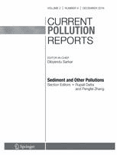
Current Pollution Reports
Fostering Collaboration for a Sustainable PlanetCurrent Pollution Reports, published by Springer Heidelberg, is an esteemed journal in the field of environmental science, focusing on the multifaceted aspects of pollution, waste management, and water science. With an impressive 2023 impact factor reflected in its status as a Q1 journal across multiple categories—including Management, Monitoring, Policy and Law, Pollution, Waste Management and Disposal, and Water Science and Technology—this journal stands at the forefront of environmental research and policy discourse. The journal, which has been in publication since 2015, aims to provide a platform for scholars and practitioners to share their findings, promoting the exchange of innovative ideas and effective solutions to pressing environmental challenges. With its rigorous peer-review process, Current Pollution Reports serves as an invaluable resource for researchers, professionals, and students committed to understanding and addressing pollution and its impacts on our planet.
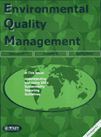
ENVIRONMENTAL QUALITY MANAGEMENT
Bridging Disciplines for Enhanced Environmental QualityENVIRONMENTAL QUALITY MANAGEMENT is a respected journal published by WILEY, focusing on interdisciplinary studies that merge environmental science with public health, management, policy, and law. Since its inception in 1991, this journal has provided a platform for researchers and practitioners to share innovative insights and advancements in understanding environmental quality and its impacts on human health and the ecosystem. With an ISSN of 1088-1913 and an E-ISSN of 1520-6483, it holds a significant position in the academic community, evidenced by its presence in the Q3 quartile across several categories, including Management, Monitoring, Policy and Law, as well as Pollution and Waste Management. Although it is not an open-access journal, it continues to be a vital resource for those in the environmental sector, offering robust evaluations and discussions that advance knowledge and foster improved practices. With Scopus rankings demonstrating its relevance among other titles in the field, ENVIRONMENTAL QUALITY MANAGEMENT plays a crucial role in shaping discourse and informing policy in an increasingly vital area of study.

ENVIRONMENTAL SCIENCE AND POLLUTION RESEARCH
Connecting Science to Solutions for Pollution ChallengesEnvironmental Science and Pollution Research is a premier international journal published by Springer Heidelberg, dedicated to advancing knowledge in the field of environmental science and pollution. With an impressive impact factor reflecting its vital contributions to research, the journal is categorized in the top quartiles (Q1 and Q2) across several domains, including Health, Toxicology and Mutagenesis, and Environmental Chemistry. Established in 1994, it continues to be a critical resource for researchers, professionals, and students focusing on pressing environmental issues. The journal provides an insightful platform for disseminating significant findings related to pollution and its effects on health and the environment, contributing to a better understanding and resolution of these challenges. While it currently does not offer Open Access options, its inclusion in prominent rankings, such as the Scopus rankings, underscores its reputation and influence within the scientific community.
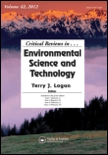
CRITICAL REVIEWS IN ENVIRONMENTAL SCIENCE AND TECHNOLOGY
Elevating Standards in Environmental Science and TechnologyWelcome to CRITICAL REVIEWS IN ENVIRONMENTAL SCIENCE AND TECHNOLOGY, an esteemed journal published by Taylor & Francis Inc. This journal has been at the forefront of environmental research since its inception in 1993, spanning a wide range of disciplines including environmental engineering, pollution control, waste management, and water science. CRITICAL REVIEWS holds an impressive Q1 ranking in multiple categories, including Environmental Engineering and Pollution, demonstrating its critical role in advancing knowledge within the field. With a remarkable Scopus ranking—placing it in the top 1% for Environmental Science categories—this journal serves as an invaluable resource for researchers, professionals, and students alike, providing comprehensive reviews and analyses that catalyze innovative solutions to pressing environmental challenges. Though currently not open access, the journal's content is accessible through various academic platforms, ensuring that cutting-edge research is available to a global audience. Join the community of scholars dedicated to enhancing our understanding of environmental science and technology through rigorous investigation and critical discourse.